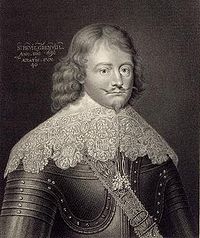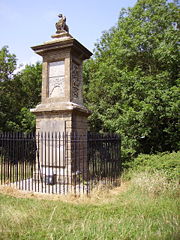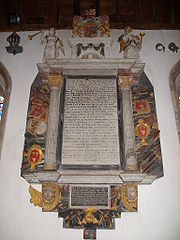
Bevil Grenville
Encyclopedia

House of Commons of England
The House of Commons of England was the lower house of the Parliament of England from its development in the 14th century to the union of England and Scotland in 1707, when it was replaced by the House of Commons of Great Britain...
between 1621 and 1642. He was a Royalist
Cavalier
Cavalier was the name used by Parliamentarians for a Royalist supporter of King Charles I and son Charles II during the English Civil War, the Interregnum, and the Restoration...
soldier in the English Civil War
English Civil War
The English Civil War was a series of armed conflicts and political machinations between Parliamentarians and Royalists...
and was killed in action at the Battle of Lansdowne
Battle of Lansdowne
The English Civil War battle of Lansdowne was fought on 5 July 1643, near Bath, southwest England. Although the Royalists under Lord Hopton forced the Parliamentarians under Sir William Waller to retreat from their hilltop position, they suffered so many casualties themselves and were left so...
.
Backgound
Grenville was born near WithielWithiel
Withiel is a civil parish and village in Cornwall, United Kingdom. The name Withiel is derived from the Cornish word Gwydhyel, meaning wooded place...
, west of Bodmin
Bodmin
Bodmin is a civil parish and major town in Cornwall, England, United Kingdom. It is situated in the centre of the county southwest of Bodmin Moor.The extent of the civil parish corresponds fairly closely to that of the town so is mostly urban in character...
, Cornwall
Cornwall
Cornwall is a unitary authority and ceremonial county of England, within the United Kingdom. It is bordered to the north and west by the Celtic Sea, to the south by the English Channel, and to the east by the county of Devon, over the River Tamar. Cornwall has a population of , and covers an area of...
, the son of Sir Bernard Grenville and Elizabeth Bevil, and grandson of Sir Richard Grenville
Richard Grenville
Sir Richard Grenville was an English sailor, sea captain and explorer. He took part in the early English attempts to settle the New World, and also participated in the fight against the Spanish Armada...
, Elizabethan
Elizabethan era
The Elizabethan era was the epoch in English history of Queen Elizabeth I's reign . Historians often depict it as the golden age in English history...
sailor
Sailor
A sailor, mariner, or seaman is a person who navigates water-borne vessels or assists in their operation, maintenance, or service. The term can apply to professional mariners, military personnel, and recreational sailors as well as a plethora of other uses...
, explorer
Exploration
Exploration is the act of searching or traveling around a terrain for the purpose of discovery of resources or information. Exploration occurs in all non-sessile animal species, including humans...
, and soldier
Soldier
A soldier is a member of the land component of national armed forces; whereas a soldier hired for service in a foreign army would be termed a mercenary...
. He married Lady Grace Smythe, daughter of Sir George Smythe. They had fourteen children together, one of whom was John Grenville, 1st Earl of Bath. He was educated at Exeter College, Oxford
Exeter College, Oxford
Exeter College is one of the constituent colleges of the University of Oxford in England and the fourth oldest college of the University. The main entrance is on the east side of Turl Street...
.
Parliamentary career
Grenville was elected Member of ParliamentMember of Parliament
A Member of Parliament is a representative of the voters to a :parliament. In many countries with bicameral parliaments, the term applies specifically to members of the lower house, as upper houses often have a different title, such as senate, and thus also have different titles for its members,...
for Cornwall
Cornwall (UK Parliament constituency)
Cornwall is a former county constituency covering the county of Cornwall, in the South West of England. It was a constituency of the House of Commons of England then of the House of Commons of Great Britain from 1707 to 1800 and of the House of Commons of the United Kingdom from 1801 to 1832...
in 1621 and remained until 1625. Under King Charles I he became MP for Launceston
Launceston (UK Parliament constituency)
Launceston, also known at some periods as Dunheved, was a parliamentary constituency in Cornwall which returned two Members of Parliament to the British House of Commons from 1295 until 1832, and one member from 1832 until 1918...
in 1625 where he remained until King Charles decided to rule without parliament in 1629. In parliament, Grenville supported Sir John Eliot
John Eliot (statesman)
Sir John Eliot was an English statesman who was serially imprisoned in the Tower of London, where he eventually died, by King Charles I for advocating the rights and privileges of Parliament.-Family and early life:...
and the opposition, and his intimacy with Eliot was lifelong. In 1639, however, he appears as a royalist going to the Scottish War in the train of Charles I
Charles I of England
Charles I was King of England, King of Scotland, and King of Ireland from 27 March 1625 until his execution in 1649. Charles engaged in a struggle for power with the Parliament of England, attempting to obtain royal revenue whilst Parliament sought to curb his Royal prerogative which Charles...
. The reasons for this change of front are unknown, but Grenville's honour was above suspicion and he must have entirely convinced himself that he was doing right. At any rate he was a very valuable recruit to the royalist cause, being the most generally loved man in Cornwall. When parliament reassembled for the Short Parliament
Short Parliament
The Short Parliament was a Parliament of England that sat from 13 April to 5 May 1640 during the reign of King Charles I of England, so called because it lasted only three weeks....
in April 1640, Grenville was chosen as MP for Launceston again. In November he was elected MP for Cornwall again for the Long Parliament
Long Parliament
The Long Parliament was made on 3 November 1640, following the Bishops' Wars. It received its name from the fact that through an Act of Parliament, it could only be dissolved with the agreement of the members, and those members did not agree to its dissolution until after the English Civil War and...
. He was disabled in 1642 for supporting the Royalists.
English Civil War

Posse comitatus (common law)
Posse comitatus or sheriff's posse is the common-law or statute law authority of a county sheriff or other law officer to conscript any able-bodied males to assist him in keeping the peace or to pursue and arrest a felon, similar to the concept of the "hue and cry"...
was called out to expel them. Under the command of Sir Ralph Hopton
Ralph Hopton, 1st Baron Hopton
Ralph Hopton, 1st Baron Hopton was a Royalist commander in the English Civil War.-Life:Hopton was the son of Robert Hopton of Witham Somerset. He was apparently educated at Lincoln College, Oxford and served in the army of Frederick V, Elector Palatine in the early campaigns of the Thirty...
, Sir Bevil took a distinguished part in the Battle of Braddock Down
Battle of Braddock Down
The Battle of Braddock Down was a battle of the south-western campaign of the First English Civil War. It was fought on open ground in Cornwall, on 19 January 1643...
and, at Stratton
Stratton, Cornwall
Stratton is a small town situated near the coastal resort of Bude in north Cornwall, UK. It was also the name of one of ten ancient administrative shires of Cornwall - see "Hundreds of Cornwall"...
(May 16, 1643), where the parliamentary
Roundhead
"Roundhead" was the nickname given to the supporters of the Parliament during the English Civil War. Also known as Parliamentarians, they fought against King Charles I and his supporters, the Cavaliers , who claimed absolute power and the divine right of kings...
Earl of Stamford
Henry Grey, 1st Earl of Stamford
Henry Grey, 1st Earl of Stamford , known as the Lord Grey of Groby from 1614 to 1628, was an English nobleman and military leader. He was the eldest son of Sir John Grey and Elizabeth Nevill...
was completely routed by the Cornishmen
Cornish people
The Cornish are a people associated with Cornwall, a county and Duchy in the south-west of the United Kingdom that is seen in some respects as distinct from England, having more in common with the other Celtic parts of the United Kingdom such as Wales, as well as with other Celtic nations in Europe...
, he led one of the storming parties which captured Chudleigh
Chudleigh
Chudleigh is a small town in Devon, England located between the towns of Newton Abbot and Exeter.Chudleigh is very close to the edge of Dartmoor and bypassed by the A38 road in 1972. It began life as a small wool market town, though the nearby Castle Dyke is an Iron Age Hill Fort which demonstrates...
's lines. He then led his men on a victorious march through Devon
Devon
Devon is a large county in southwestern England. The county is sometimes referred to as Devonshire, although the term is rarely used inside the county itself as the county has never been officially "shired", it often indicates a traditional or historical context.The county shares borders with...
into Somerset
Somerset
The ceremonial and non-metropolitan county of Somerset in South West England borders Bristol and Gloucestershire to the north, Wiltshire to the east, Dorset to the south-east, and Devon to the south-west. It is partly bounded to the north and west by the Bristol Channel and the estuary of the...
.
A month later, the endeavour of Hopton to unite with Maurice
Prince Maurice von Simmern
Prince Maurice of the Palatinate KG , Count Palatine of the Rhine, was the fourth son of Frederick V, Elector Palatine and Princess Elizabeth, only daughter of James I, King of England and Scotland and Anne of Denmark....
and Hertford
Marquess of Hertford
The titles of Earl of Hertford and Marquess of Hertford have been created several times in the peerages of England and Great Britain.The third Earldom of Hertford was created in 1559 for Edward Seymour, who was simultaneously created Baron Beauchamp of Hache...
from Oxford brought on the Battle of Lansdowne
Battle of Lansdowne
The English Civil War battle of Lansdowne was fought on 5 July 1643, near Bath, southwest England. Although the Royalists under Lord Hopton forced the Parliamentarians under Sir William Waller to retreat from their hilltop position, they suffered so many casualties themselves and were left so...
, near Bath. Here Grenville was killed at the head of the Cornish infantry as it reached the top of the hill. He received a blow to the head with a pole axe and was taken to the rectory at Cold Ashton
Cold Ashton
Cold Ashton is a village in South Gloucestershire, England. The village church has a 14th century tower and the rest of the church was rebuilt in the 16th century by Thomas Key, its rector....
where he died. His death was a blow from which the king's cause in the West never recovered, for he alone knew how to handle the Cornishmen. Hopton they revered and respected but Grenville they loved as peculiarly their own commander and, after his death, there is little more heard of the reckless valour which had won Stratton and Lansdown.
Memorials

Encyclopædia Britannica Eleventh Edition
The Encyclopædia Britannica Eleventh Edition is a 29-volume reference work, an edition of the Encyclopædia Britannica. It was developed during the encyclopaedia's transition from a British to an American publication. Some of its articles were written by the best-known scholars of the time...
: "Grenville was the type of all that was best in royalism. He was neither rapacious, drunken nor dissolute, but his loyalty was unselfish, his life pure and his skill no less than his bravery unquestionable." His giant servant Anthony Payne brought his body back to Kilkhampton. His Cornish soldiers refused to fight under any other leader and returned home, carrying the body of Sir Bevil. It was buried in a tomb in Kilkhampton
Kilkhampton
Kilkhampton is a village and civil parish in northeast Cornwall, United Kingdom. The village is situated on the A39 approximately four miles north-northeast of Bude.Kilkhampton was mentioned in the Domesday Book as "Chilchetone"...
Church.
A monument
Sir Bevil Grenville's Monument
Sir Bevil Grenville's Monument is a monument erected on Lansdowne Hill, Bath, England, to commemorate the heroism of Sir Bevil Grenville and his Cornish pikemen at the Battle of Lansdowne, 1643...
to him was erected on the field of Lansdown to commemorate the heroism and that of his Cornish pikemen at the Battle of Lansdown.
Alan M. Kent
Alan M. Kent
Alan M. Kent is a Cornish poet, novelist, dramatist, author and editor of a number of works on Cornish and Anglo-Cornish literature.-Creative writing:* Proper Job, Charlie Curnow!* Electric Pastyland...
has written a poem about Payne: Oogly es Sin: the Lamentable Ballad of Anthony Payne, Cornish Giant.
See also
- John Granville, 1st Earl of BathJohn Granville, 1st Earl of BathJohn Granville, 1st Earl of Bath PC was an English royalist statesman, whose highest position was Lord Lieutenant of Ireland....
, his son - Sir Richard Grenville, 1st BaronetSir Richard Grenville, 1st BaronetSir Richard Grenville, 1st Baronet was a Cornish Royalist leader during the English Civil War.He was the third son of Sir Bernard Grenville , and a grandson of the famous seaman, Sir Richard Grenville...
- The Gear RoutThe Gear RoutThe Gear Rout was a Cornish insurrection of 1648 following the end of the English Civil War. It involved some 500 Cornish rebels who fought on the Royalist side against the Parliamentarian forces of Sir Hardress Waller....
- William ScawenWilliam ScawenWilliam Scawen was a one of the pioneers in the revival of the Cornish Language in England. He was a politician who sat in the House of Commons in 1640 and fought for the Royalist cause in the English Civil War....

